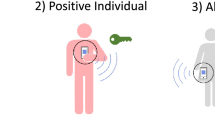Abstract
The outbreak of the COVID-19 pandemic created an unequal need for limiting physical contacts and tracing possible exposures to a novel coronavirus. Smartphone-based contact tracing applications (CTAs) were presented as a vehicle for stopping virus transmission chains and supporting the work of contact tracing teams. In this study, older adults’ adoption of a CTA was studied using socioeconomic background factors, satisfaction with health, and the measure of digital activity as predictors. The data were drawn from a larger questionnaire survey targeted at older internet users. A subsample of older Finnish internet users (N = 723) was analyzed using a logistic regression model. Results showed that older internet users had widely adopted the Finnish CTA called Koronavilkku irrespective of demographic background factors, level of education, and self-assessed satisfaction with health. Besides high income and retirement status, digital activity measured through the breadth of mobile phone features used and the use of an online symptom checker increased the likelihood of having the CTA installed on a smartphone. The results of the study lend themselves to be used for future epidemics and other occasions that require a real-time and/or retrospective tracing of people and their physical encounters.
Access this chapter
Tax calculation will be finalised at checkout
Purchases are for personal use only
Similar content being viewed by others
References
Altmann, S., et al.: Acceptability of app-based contact tracing for COVID-19: cross-country survey study. JMIR Mhealth Uhealth 8(8), e19857 (2020)
Jonker, M., de Bekker-Grob, E., Veldwijk, J., Goossens, L., Bour, S., Rutten-Van Mölken, M.: COVID-19 contact tracing apps: predicted uptake in the Netherlands based on a discrete choice experiment. JMIR Mhealth Uhealth 8(10), e20741 (2020)
Bidzan-Bluma, I., et al.: A Polish and German population study of quality of life, well-being, and life satisfaction in older adults during the COVID-19 pandemic. Front. Psych. 11, 585813 (2020)
Campos-Castillo, C.: Gender divides in engagement with COVID-19 information on the internet among US older adults. J. Gerontol. Ser. B 76(3), e104–e110 (2021)
Zhou, F., et al.: Clinical course and risk factors for mortality of adult inpatients with COVID-19 in Wuhan, China: a retrospective cohort study. Lancet 395(10229), 1054–1062 (2020)
Xie, B., Charness, N., Fingerman, K., Kaye, J., Kim, M.T., Khurshid, A.: When going digital becomes a necessity: ensuring older adults’ needs for information, services, and social inclusion during COVID-19. J. Aging Soc. Policy 32(4–5), 460–470 (2020)
STM: Uusi koronavirus—COVID-19 Toimintaohjeita yli 70-vuotiaille. https://aineistopankki.thl.fi/l/wFdKSXz2Jdg7. Accessed 4 Jan 2022
Abeler, J., Bäcker, M., Buermeyer, U., Zillessen, H.: COVID-19 contact tracing and data protection can go together. JMIR Mhealth Uhealth 8(4), e19359 (2020)
Savona, M.: The saga of the COVID-19 contact tracing apps: lessons for data governance. In: SPRU Working Paper Series SWPS 2020–10 (June), University of Sussex. https://www.sussex.ac.uk/webteam/gateway/file.php?name=2020-10-swps-savona.pdf&site=25. Accessed 4 Jan 2022
Official Statistics of Finland: Use of information and communications technology by individuals. https://www.stat.fi/til/sutivi/2020/sutivi_2020_2020-11-10_tau_013_fi. Accessed 4 Jan 2022
Hänninen, R., Pajula, L., Korpela, V., Taipale, S.: Individual and shared digital repertoires—older adults managing digital services. Inf. Commun. Soc. 1–16 (2021)
Hänninen, R., Taipale, S., Luostari, R.: Exploring heterogeneous ICT use among older adults: the warm experts’ perspective. New Media Soc. 23(6), 1584–1601 (2021)
Du, L., Raposo, V.L., Wang, M.: COVID-19 contact tracing apps: a technologic Tower of Babel and the gap for international pandemic control. JMIR Mhealth Uhealth 8(11), e23194 (2020)
Hargittai, E., Redmiles, E.M., Vitak, J., Zimmer, M.: Americans’ willingness to adopt a COVID-19 tracking app. First Monday 25(11) (2020)
von Wyl, V., et al.: Drivers of acceptance of COVID-19 proximity tracing apps in Switzerland: panel survey analysis. JMIR Publ. Health Surveill. 7(1), e25701 (2021)
Lin, J., Carter, L., Liu, D.: Privacy concerns and digital government: exploring citizen willingness to adopt the COVIDSafe app. Eur. J. Inf. Syst. 1–14. (2021)
Montagni, I., Roussel, N., Thiébaut, R., Tzourio, C.: Health care students’ knowledge of and attitudes, beliefs, and practices toward the French COVID-19 app: cross-sectional questionnaire study. J. Med. Internet Res. 23(3), e26399 (2021)
THL: Koronavilkku has been downloaded more than 2.5 million times—widespread use increases the app’s effectiveness. https://thl.fi/en/web/thlfi-en/-/koronavilkku-has-been-downloaded-more-than-2.5-million-times-widespread-use-increases-the-app-s-effectiveness. Accessed 4 Jan 2022
Ivan, L., Schiau, I.: Older audiences and digital media: focus on Romania. Manag. Dyn. Knowl. Econ. 6(3), 423–447 (2018)
Jenniskens, K., et al.: Effectiveness of contact tracing apps for SARS-CoV-2: a rapid systematic review. BMJ Open 11(7), e050519 (2021)
Acknowledgments
This study was funded by the Strategic Research Council at the Academy of Finland (grants 327145 and 327149 for the DigiIN project) and the Academy of Finland for the Centre of Excellence in Research on Ageing and Care (grants 312367 and 336671).
Author information
Authors and Affiliations
Corresponding author
Editor information
Editors and Affiliations
Rights and permissions
Copyright information
© 2022 The Author(s), under exclusive license to Springer Nature Switzerland AG
About this paper
Cite this paper
Taipale, S., Oinas, T. (2022). Adoption of a COVID-19 Contact Tracing App Among Older Internet Users in Finland. In: Gao, Q., Zhou, J. (eds) Human Aspects of IT for the Aged Population. Design, Interaction and Technology Acceptance. HCII 2022. Lecture Notes in Computer Science, vol 13330. Springer, Cham. https://doi.org/10.1007/978-3-031-05581-2_42
Download citation
DOI: https://doi.org/10.1007/978-3-031-05581-2_42
Published:
Publisher Name: Springer, Cham
Print ISBN: 978-3-031-05580-5
Online ISBN: 978-3-031-05581-2
eBook Packages: Computer ScienceComputer Science (R0)




